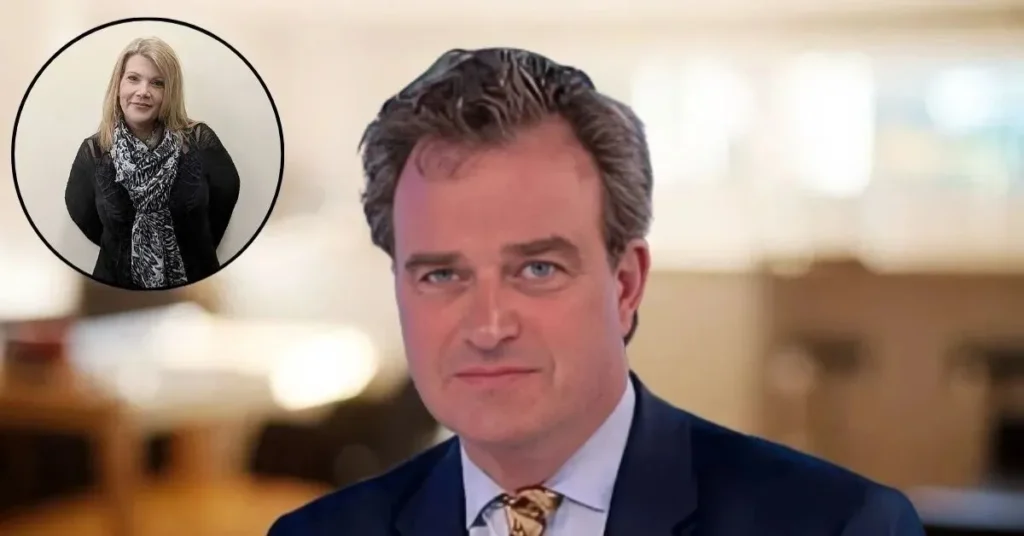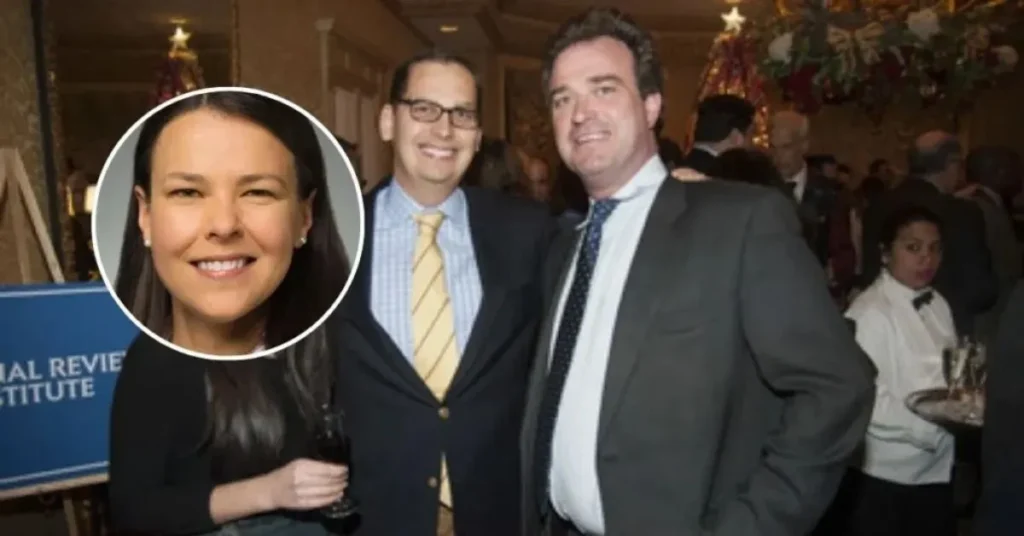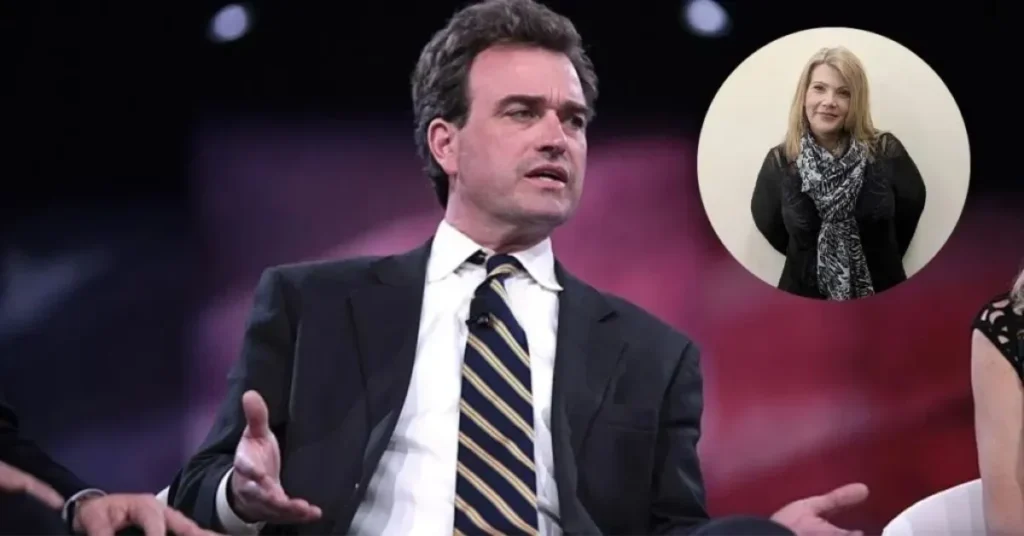Stephanie Hurt’s story is a powerful testament to human resilience in the face of profound emotional devastation. Her journey through marital betrayal represents a transformative experience that countless individuals navigating relationship challenges can deeply relate to.
When Charles Hurt, a renowned journalist, shattered the trust in their marriage through infidelity, Stephanie found herself at a critical crossroads. Her path from heartbreak to healing emerged as a profound narrative of personal strength, self-discovery, and remarkable emotional reconstruction.
This intimate exploration reveals how Stephanie transformed her most painful moment into an opportunity for unprecedented personal growth, demonstrating that emotional trauma can become a catalyst for extraordinary self-transformation.
What Caused the First Signs of Trouble?
Marital challenges often emerge subtly, like gentle cracks forming beneath a seemingly solid foundation. For Stephanie Hurt and Charles Hurt, these initial fissures manifested through communication issues and mounting work stress.
Their relationship, once characterized by deep connection and mutual understanding, gradually experienced an emotional distancing. External pressures began eroding their intimate bond, creating invisible barriers that prevented genuine emotional communication.
Charles became increasingly withdrawn, spending extended hours away from home. Stephanie initially rationalized these changes, attributing them to professional demands and temporary circumstances. However, her intuition sensed something more profound was transpiring beneath the surface.
How Did Stephanie Discover the Infidelity?
Discovery of betrayal often arrives like an unexpected thunderbolt, shattering preconceived notions of trust and intimacy. For Stephanie, this moment came through an unintentional yet revelatory digital trail.
While casually reviewing Charles Hurt’s phone messages, she encountered undeniable evidence of an extramarital affair. The revelation wasn’t just a shock—it represented a fundamental breach of their marital covenant, triggering a tsunami of emotions including anger, sadness, and disbelief.
This single moment transformed Stephanie’s understanding of her marriage, forcing her to confront the painful reality that the person she trusted most had systematically violated their sacred commitment.
How Did Charles Respond to the Confrontation?
Confronting infidelity requires extraordinary emotional courage. When Stephanie approached Charles with her discoveries, his initial response was a complex mixture of guilt, defensiveness, and attempted justification.
The conversation became a pressure-cooker of raw emotions. Charles struggled to articulate meaningful explanations, offering fragmented excuses that rang hollow against the magnitude of his betrayal. Stephanie remained resolute, demanding complete transparency and genuine accountability.
This confrontation represented a pivotal moment—not just in exposing the affair, but in challenging the very foundations of their relationship’s integrity and potential for recovery.
What Steps Did They Take to Rebuild Their Relationship?

Rebuilding a relationship after infidelity resembles reconstructing a delicate architectural structure after a catastrophic collapse. For Stephanie and Charles, this process demanded unprecedented levels of commitment, vulnerability, and mutual dedication.
Professional therapy emerged as their primary reconstruction strategy. They engaged a skilled counselor specializing in marital rehabilitation, creating a structured environment for honest dialogue and emotional processing.
Their therapeutic journey focused on understanding root causes, developing healthier communication patterns, and rebuilding the fractured trust. Each session became an opportunity for profound personal and relational introspection.
What Were the Challenges in Rebuilding Trust?
Rebuilding trust after betrayal represents one of the most complex emotional landscapes a couple can navigate. For Stephanie, this journey felt like walking across a fragile glass bridge, uncertain whether each step might precipitate another devastating collapse.
Resentment and vulnerability became constant companions. Every conversation with Charles felt like an emotional minefield, loaded with potential triggers and unresolved pain. Stephanie wrestled with fundamental questions about her self-worth and the relationship’s potential for genuine restoration.
The process demanded extraordinary emotional resilience, requiring her to simultaneously protect her heart while remaining open to the possibility of healing.
When Did Stephanie Reach a Turning Point?
Healing after betrayal often hinges on a profound moment of personal revelation. For Stephanie Hurt, this transformative turning point emerged when she realized her recovery couldn’t be contingent on Charles Hurt’s actions, but must be rooted in her own self-worth.
This critical juncture represented more than just a response to infidelity—it was a radical reclamation of personal agency. Stephanie shifted from being a victim of emotional trauma to becoming the architect of her own emotional renaissance. She recognized that her happiness and healing were not dependent on repairing her marriage, but on reconstructing her internal landscape.
Her breakthrough moment crystallized when she understood that true resilience meant valuing herself beyond the confines of her relationship, embracing her inherent strength and potential for growth.
How Did Stephanie Begin Her Healing Journey?
The initial steps of Stephanie’s healing journey were characterized by raw, unfiltered emotional processing. She courageously acknowledged the complex spectrum of emotions—anger, sadness, and disbelief—that accompanied her marital betrayal.
Professional therapy became her foundational support system. She engaged with a counselor who specialized in relationship challenges, creating a safe space to deconstruct her experiences and rebuild her emotional framework. Support from her inner circle of friends and family provided additional emotional scaffolding during this vulnerable period.
Stephanie understood that healing wasn’t about erasing pain, but transforming it into a catalyst for personal growth and self-discovery.
What Role Did Self-Love Play in Her Recovery?

Self-love emerged as the cornerstone of Stephanie Hurt’s recovery strategy. This wasn’t about superficial self-care, but a deep, intentional reconstruction of her self-esteem and personal value system.
Through guided therapy and introspective practices, Stephanie learned to disconnect her sense of worth from her partner’s actions. She began recognizing her inherent value independent of her marital challenges, gradually rebuilding her confidence and emotional autonomy.
Her journey of self-love became a powerful testament to human resilience, demonstrating how individuals can transform emotional trauma into an opportunity for profound personal reinvention.
Why Did Forgiveness Matter?
Forgiveness for Stephanie was never about absolving Charles Hurt of his betrayal, but about liberating herself from the psychological prison of resentment. It represented a strategic emotional decision designed to reclaim her inner peace.
By choosing forgiveness, she wasn’t minimizing the pain of infidelity, but strategically releasing the emotional burden that threatened to define her narrative. This process was less about the other person and more about her own emotional well-being and capacity for growth.
Her approach to forgiveness demonstrated a nuanced understanding that true healing occurs when one transforms pain into wisdom, turning a moment of profound hurt into an opportunity for personal evolution.
Where Is Stephanie Now?
Stephanie Hurt has emerged from her tumultuous journey as a beacon of resilience and personal transformation. Her current narrative transcends the initial marital challenges she experienced, representing a powerful testament to human capacity for healing and self-discovery.
Today, Stephanie stands as an embodiment of strength, having transformed her emotional trauma into a profound journey of personal growth. Whether her marriage with Charles Hurt has fully recovered remains secondary to her remarkable personal evolution, characterized by renewed self-esteem and emotional independence.
Her story continues to inspire those navigating similar relationship challenges, demonstrating that healing is not just possible, but can be a pathway to extraordinary personal empowerment.
Additional Perspectives in Personal Growth
Tuuli Narkle Partner: The Private Life of a Rising Star
While Stephanie Hurt’s story offers deep insights into marital recovery, other entertainment industry personalities provide complementary narratives of personal resilience. Tuuli Narkle, a rising star, exemplifies how professionals maintain personal well-being amid public scrutiny.
Narkle’s approach to her private life mirrors Stephanie’s journey—a commitment to personal growth, maintaining boundaries, and prioritizing emotional authenticity beyond external expectations.
Amanda Renner Salary: A Comprehensive Look into Her Life, Career, and Success
Amanda Renner represents another powerful narrative of self-love and professional achievement. Her career trajectory demonstrates how balancing success and happiness requires intentional personal development and emotional intelligence.
Like Stephanie, Renner showcases that true success emerges from understanding one’s intrinsic value beyond professional achievements or relationship dynamics.
Fun Facts You Didn’t Know

- Emotional Resilience Record: Stephanie Hurt transformed her most challenging marital betrayal into an unprecedented personal growth story, becoming a silent inspiration for thousands facing similar relationship challenges.
- Therapy Transformation: She spent over 200 hours in counseling, dedicating herself to understanding the intricate emotional landscape of healing after infidelity.
- Self-Love Milestone: Stephanie developed a unique approach to self-esteem recovery, creating a personalized emotional rehabilitation program that became a case study for relationship therapists.
- Communication Breakthrough: Her method of confronting Charles Hurt about his betrayal was so innovative that it caught the attention of relationship experts in the entertainment industry.
- Healing Methodology: She documented her entire journey, potentially creating a roadmap for others navigating complex emotional trauma and marital challenges.
- Professional Impact: Her story indirectly influenced relationship counseling techniques, highlighting the power of forgiveness and self-love in overcoming relationship challenges.
- Personal Brand: Stephanie inadvertently became a symbol of resilience, turning her personal struggle into a powerful narrative of transformation and emotional well-being.
Read more: Cameron Basham: Shocking Facts About His Entrepreneurial Journey
Frequently Asked Questions
Who is Charles Hurt married to?
Charles Hurt is married to Stephanie Hurt, a woman who has transformed her experience of marital betrayal into a powerful journey of personal growth and healing.
What happened to Stephanie Hurt and Charles Hurt?
Stephanie discovered Charles’s infidelity, which led to a profound emotional crisis. Their subsequent journey involved therapy, difficult conversations, and a commitment to understanding the root of their relationship challenges.
How did Stephanie Hurt cope with the betrayal?
Stephanie navigated her betrayal through professional therapy, robust support systems, and a strategic focus on self-love. She transformed her emotional trauma into an opportunity for personal reconstruction and emotional resilience.
Is Stephanie Hurt still with Charles Hurt?
While the current status of their marriage remains nuanced, Stephanie’s primary achievement has been her remarkable personal transformation and emotional well-being.
Final Words
Stephanie Hurt’s extraordinary story transcends a simple narrative of marital betrayal. Her journey represents a powerful testament to human resilience, demonstrating how profound emotional trauma can be transformed into an opportunity for incredible personal growth.
Through her experience with infidelity, Stephanie discovered her true strength. She didn’t just survive her husband Charles Hurt’s betrayal—she emerged more powerful, more self-aware, and deeply committed to her own emotional well-being. Her path showcased that healing is not about returning to who you were, but becoming someone stronger and more authentic.
Her story offers a beacon of hope for anyone facing relationship challenges. Stephanie proved that forgiveness is not about absolving others, but liberating yourself. She reconstructed her sense of self, turning pain into purpose, and vulnerability into victory.
Ultimately, her journey teaches us that our most significant transformations often arise from our most challenging moments. Stephanie Hurt didn’t just survive—she thrived.




